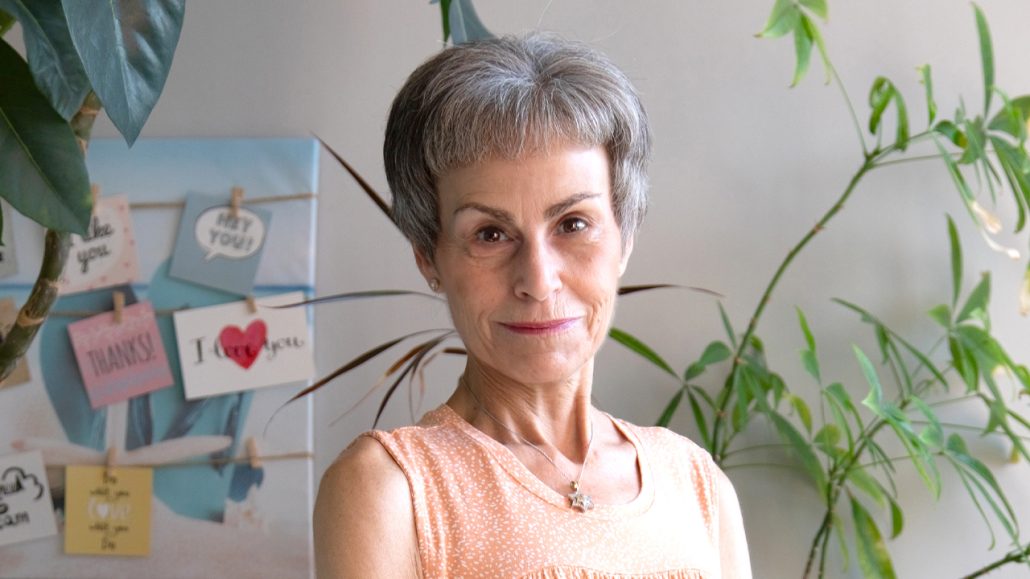After receiving support for her lifelong mental health challenges, a United Way-funded program allowed Randee to offer support to her peers
Content warning: This story contains discussion of attempted suicide.
For Randee, who has struggled with her mental health all her life, it’s taken a long time to find acceptance and understanding.
Her journey has been disjointed, filled with ups and downs that ultimately led to two suicide attempts. She spent decades being assessed and reassessed, given many labels and diagnoses that chipped away at her self-esteem.
But that’s not the story she tells today.
Because finally, after being released from yet another hospital stay, Randee was referred to the peer-led Krasman Centre, where she found the community and support she had long searched for. That was her turning point.
“The darkness that surrounds me is not so dark anymore and the light at the end of the tunnel gets brighter and brighter, and I can see it plain as day,” says Randee. “With that light, more things become possible. I can take hold of my life. I can start believing in the possibilities.”

The Krasman Centre’s Peer Recovery Education Program—a program funded by United Way—enabled her to assist others by becoming a Peer Supporter herself.
“This invaluable program truly changed the trajectory of my life because I learned so much about myself,” says Randee. “United Way’s help surrounding mental health and addictions is extremely important. You allow people like me to go out into the community and to educate. And to break the stigma…. I never knew that I could gain employment and work for an agency and go out and support my fellow peers. That’s what United Way can do and has done.”
Randee is involved with the Krasman Centre’s drop-in program, as well as their Welcome Basket and Transitional Support program, which offers people who are newly released from a mental health and addictions unit with wraparound supports while they transition back to living within the community. This kind of peer support creates “a soft place to land,” she says, and plays a big role in providing a sense of community and connection.
“There have been stumbles along the way, but I’ve learned to cope with them. I now have a community I can rely on for support,” says Randee. “Having the support of my peers and being a peer supporter myself, is like having and eating the cake with the icing, and a scoop of ice cream on top.”
Randee says she sees the need for mental health services all around her: “Our phone never stops with people wanting access to support.”
“You can imagine, all of the peers that were suffering before, and now add on quite possibly hundreds of thousands or millions of others, who also now suffer from depression, who also now have had their legs knocked out from under them who lost their way, who lost even their homes, their identities, simply because the whole world had shut down, and there was so much sadness and sickness around us that we didn’t know what to do.”
Rates of mental health issues continue to climb amidst rising rents, the incredibly high cost of living, the disruption to students’ learning and more, with one in four Ontarians seeking help for mental health challenges, according to the Canadian Mental Health Association.
United Way meets rising demand by funding organizations like the Krasman Centre, the Canadian Mental Health Association, and 211, in addition to a wide range of mental health and wellness services that are tailored to the needs of diverse communities. That includes funding for youth, 2SLGBTQ+ communities, ethnic communities where counselling is taboo, refugees dealing with trauma, and programs that rely on Indigenous practices.
United Way also advocates for better policies and access to mental health services, consults residents, and helps coordinate services through initiatives like Peel Region’s Mental Health and Addictions Action Table, the Wellbeing Toronto Table, and Community Action Tables in York Region.
Through funding, partnership, research and advocacy, United Way is committed to be there for people through their darkest moments.
Here’s where to get help if you or someone you know is struggling:
- Krasman Centre’s Warmline and Peer Crisis Support Services: 1-888-777-0979 (24/7), live chat on the website (from 10 a.m. to midnight)
- Talk Suicide Canada: 1-833-456-4566 (phone) | 45645 (text between 4 p.m. and midnight ET)
- Kids Help Phone: 1-800-668-6868 (phone), live chat counselling on the website
- Use the Canadian Association for Suicide Prevention’s directory to find a 24-hour crisis centre